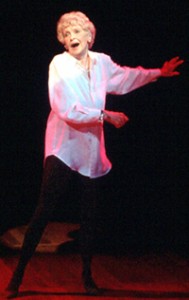In today’s Wall Street Journal “Sightings” column I discuss the current situation at the Metropolitan Opera—and, more generally, the state of opera in America today. Here’s an excerpt.
* * *
 Classical music’s number-one news story is the plight of the Metropolitan Opera, whose general manager, Peter Gelb, is facing the possibility of a crippling strike. For that reason, what he said in a recent interview deserves to be quoted at length: “Grand opera is in itself a kind of a dinosaur of an art form….The question is not whether I think I’m doing a good job or not in trying to keep the [Metropolitan Opera] alive. It’s whether I’m doing a good job or not in the face of a cultural and social rejection of opera as an art form.”
Classical music’s number-one news story is the plight of the Metropolitan Opera, whose general manager, Peter Gelb, is facing the possibility of a crippling strike. For that reason, what he said in a recent interview deserves to be quoted at length: “Grand opera is in itself a kind of a dinosaur of an art form….The question is not whether I think I’m doing a good job or not in trying to keep the [Metropolitan Opera] alive. It’s whether I’m doing a good job or not in the face of a cultural and social rejection of opera as an art form.”
Is that buck-passing defeatism, or a fair appraisal of the state of American opera?
Consider what Mr. Gelb said in a later interview, this one with the BBC. Asked about the long-term effects on audience development of the Met’s much-ballyhooed movie-house simulcasts, he replied that “75% of [the audience members] are over 65, and 30% of them are over 75….How can we possibly hope to create new audiences for this art form if we are not introducing them or educating them?” At the Met, such questions still make sense. It is, after all, a 3,800-seat house whose average ticket price is a whopping $156, whose new productions are often pointlessly glitzy and whose choice of repertoire is conservative to the point of stodginess. Of the 26 works scheduled for this coming season, only three were written after World War I.
But many critics believe that American opera elsewhere is entering a new golden age. “American—and new American—opera has become commonplace all over the land,” says Mark Swed of the Los Angeles Times. “The art form is not standing still. It’s growing, uncontrollably, by leaps and messy bounds.” And other opera executives have distanced themselves from Mr. Gelb’s pessimistic remarks. One of them, Keith Cerny, general director of the Dallas Opera, says that his company’s simulcasts, which are beamed into a football stadium, are reaching a much younger audience: “Only around 20% of [the Dallas Opera’s] simulcast audience is 65 or older….and 60% is younger than 55.” As for Houston Grand Opera, it sold 92% of its available seats last season, and is about to post its fourth consecutive balanced budget.
I don’t know anybody in the opera business who isn’t worried sick about how best to reach out to underpaid millennials who were suckled on the new on-demand pop culture, which supplies them with cheap, unchallenging amusement around the clock. Many of them inevitably see old-fashioned grand opera as hopelessly unhip. But anyone who gives it a try nowadays is in for a surprise. A growing number of American companies, including Dallas and Houston, are jumping on the new-and-unfamiliar-opera bandwagon, and doing so without busting their budgets….
* * *
Read the whole thing here.


 Stritch was past her prime when I became the drama critic of The Wall Street Journal, but I still had occasion to review her on a few noteworthy occasions, including a revival of Samuel Beckett’s Endgame in which she acquitted herself quite wonderfully well.
Stritch was past her prime when I became the drama critic of The Wall Street Journal, but I still had occasion to review her on a few noteworthy occasions, including a revival of Samuel Beckett’s Endgame in which she acquitted herself quite wonderfully well. •
•  Mrs. T and I drove up to Ontario yesterday to see four plays at the
Mrs. T and I drove up to Ontario yesterday to see four plays at the 
 I discovered Hugh MacLennan’s
I discovered Hugh MacLennan’s 